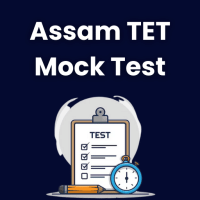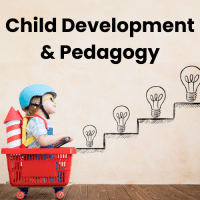Teaching Exam > Teaching Questions > Answer the following questions by selecting t...
Start Learning for Free
Answer the following questions by selecting the most appropriate option.
Q. One of the main objectives of a continuous and comprehensive evaluation is
- a)to conduct more and more tests in one academic year
- b)to test every aspect of the learner's development
- c)de-emphasize memorization
- d)to make sure the learners do not forget what they have learned
Correct answer is option 'B'. Can you explain this answer?
Most Upvoted Answer
Answer the following questions by selecting the most appropriate optio...
Explanation:
Continuous and comprehensive evaluation (CCE) is an assessment method that aims to assess every aspect of a learner's development. It focuses on evaluating the learner's knowledge, skills, attitudes, and abilities in a holistic manner. The main objective of CCE is to promote the overall development of the learner and ensure that their progress is continuously monitored and assessed.
Benefits of Comprehensive Evaluation:
1. Holistic Assessment: CCE allows for a comprehensive assessment of the learner's development. It goes beyond traditional testing methods that primarily focus on academic knowledge and memorization. CCE includes various assessment tools such as projects, presentations, group discussions, and practical demonstrations to assess different aspects of the learner's abilities.
2. Identifying Strengths and Weaknesses: By assessing various aspects of the learner's development, CCE helps in identifying their strengths and weaknesses. This information can be used to provide targeted support and interventions to enhance their learning and development.
3. Individualized Feedback: CCE provides individualized feedback to learners, highlighting their strengths and areas for improvement. This feedback helps learners understand their progress and encourages them to take ownership of their learning.
4. Continuous Monitoring: CCE emphasizes continuous monitoring of the learner's progress throughout the academic year. This allows teachers to identify any gaps in learning or areas where additional support may be required. It also helps in identifying the effectiveness of teaching strategies and making necessary adjustments.
5. Reduced Stress and Pressure: Unlike traditional examination systems that place a heavy emphasis on performance in a single test, CCE reduces stress and pressure on learners. It provides multiple opportunities for assessment, allowing learners to showcase their abilities in different ways and reducing the fear of failure.
6. Lifelong Learning: CCE promotes lifelong learning by encouraging learners to develop a range of skills and competencies beyond academic knowledge. It instills qualities such as critical thinking, problem-solving, creativity, and collaboration, which are essential for success in the real world.
In conclusion, the main objective of continuous and comprehensive evaluation is to assess every aspect of the learner's development. It aims to go beyond memorization and traditional testing methods, promoting a holistic approach to assessment that supports the overall growth and development of learners.
Continuous and comprehensive evaluation (CCE) is an assessment method that aims to assess every aspect of a learner's development. It focuses on evaluating the learner's knowledge, skills, attitudes, and abilities in a holistic manner. The main objective of CCE is to promote the overall development of the learner and ensure that their progress is continuously monitored and assessed.
Benefits of Comprehensive Evaluation:
1. Holistic Assessment: CCE allows for a comprehensive assessment of the learner's development. It goes beyond traditional testing methods that primarily focus on academic knowledge and memorization. CCE includes various assessment tools such as projects, presentations, group discussions, and practical demonstrations to assess different aspects of the learner's abilities.
2. Identifying Strengths and Weaknesses: By assessing various aspects of the learner's development, CCE helps in identifying their strengths and weaknesses. This information can be used to provide targeted support and interventions to enhance their learning and development.
3. Individualized Feedback: CCE provides individualized feedback to learners, highlighting their strengths and areas for improvement. This feedback helps learners understand their progress and encourages them to take ownership of their learning.
4. Continuous Monitoring: CCE emphasizes continuous monitoring of the learner's progress throughout the academic year. This allows teachers to identify any gaps in learning or areas where additional support may be required. It also helps in identifying the effectiveness of teaching strategies and making necessary adjustments.
5. Reduced Stress and Pressure: Unlike traditional examination systems that place a heavy emphasis on performance in a single test, CCE reduces stress and pressure on learners. It provides multiple opportunities for assessment, allowing learners to showcase their abilities in different ways and reducing the fear of failure.
6. Lifelong Learning: CCE promotes lifelong learning by encouraging learners to develop a range of skills and competencies beyond academic knowledge. It instills qualities such as critical thinking, problem-solving, creativity, and collaboration, which are essential for success in the real world.
In conclusion, the main objective of continuous and comprehensive evaluation is to assess every aspect of the learner's development. It aims to go beyond memorization and traditional testing methods, promoting a holistic approach to assessment that supports the overall growth and development of learners.

|
Explore Courses for Teaching exam
|

|
Question Description
Answer the following questions by selecting the most appropriate option.Q. One of the main objectives of a continuous and comprehensive evaluation isa)to conduct more and more tests in one academic yearb)to test every aspect of the learners developmentc)de-emphasize memorizationd)to make sure the learners do not forget what they have learnedCorrect answer is option 'B'. Can you explain this answer? for Teaching 2025 is part of Teaching preparation. The Question and answers have been prepared according to the Teaching exam syllabus. Information about Answer the following questions by selecting the most appropriate option.Q. One of the main objectives of a continuous and comprehensive evaluation isa)to conduct more and more tests in one academic yearb)to test every aspect of the learners developmentc)de-emphasize memorizationd)to make sure the learners do not forget what they have learnedCorrect answer is option 'B'. Can you explain this answer? covers all topics & solutions for Teaching 2025 Exam. Find important definitions, questions, meanings, examples, exercises and tests below for Answer the following questions by selecting the most appropriate option.Q. One of the main objectives of a continuous and comprehensive evaluation isa)to conduct more and more tests in one academic yearb)to test every aspect of the learners developmentc)de-emphasize memorizationd)to make sure the learners do not forget what they have learnedCorrect answer is option 'B'. Can you explain this answer?.
Answer the following questions by selecting the most appropriate option.Q. One of the main objectives of a continuous and comprehensive evaluation isa)to conduct more and more tests in one academic yearb)to test every aspect of the learners developmentc)de-emphasize memorizationd)to make sure the learners do not forget what they have learnedCorrect answer is option 'B'. Can you explain this answer? for Teaching 2025 is part of Teaching preparation. The Question and answers have been prepared according to the Teaching exam syllabus. Information about Answer the following questions by selecting the most appropriate option.Q. One of the main objectives of a continuous and comprehensive evaluation isa)to conduct more and more tests in one academic yearb)to test every aspect of the learners developmentc)de-emphasize memorizationd)to make sure the learners do not forget what they have learnedCorrect answer is option 'B'. Can you explain this answer? covers all topics & solutions for Teaching 2025 Exam. Find important definitions, questions, meanings, examples, exercises and tests below for Answer the following questions by selecting the most appropriate option.Q. One of the main objectives of a continuous and comprehensive evaluation isa)to conduct more and more tests in one academic yearb)to test every aspect of the learners developmentc)de-emphasize memorizationd)to make sure the learners do not forget what they have learnedCorrect answer is option 'B'. Can you explain this answer?.
Solutions for Answer the following questions by selecting the most appropriate option.Q. One of the main objectives of a continuous and comprehensive evaluation isa)to conduct more and more tests in one academic yearb)to test every aspect of the learners developmentc)de-emphasize memorizationd)to make sure the learners do not forget what they have learnedCorrect answer is option 'B'. Can you explain this answer? in English & in Hindi are available as part of our courses for Teaching.
Download more important topics, notes, lectures and mock test series for Teaching Exam by signing up for free.
Here you can find the meaning of Answer the following questions by selecting the most appropriate option.Q. One of the main objectives of a continuous and comprehensive evaluation isa)to conduct more and more tests in one academic yearb)to test every aspect of the learners developmentc)de-emphasize memorizationd)to make sure the learners do not forget what they have learnedCorrect answer is option 'B'. Can you explain this answer? defined & explained in the simplest way possible. Besides giving the explanation of
Answer the following questions by selecting the most appropriate option.Q. One of the main objectives of a continuous and comprehensive evaluation isa)to conduct more and more tests in one academic yearb)to test every aspect of the learners developmentc)de-emphasize memorizationd)to make sure the learners do not forget what they have learnedCorrect answer is option 'B'. Can you explain this answer?, a detailed solution for Answer the following questions by selecting the most appropriate option.Q. One of the main objectives of a continuous and comprehensive evaluation isa)to conduct more and more tests in one academic yearb)to test every aspect of the learners developmentc)de-emphasize memorizationd)to make sure the learners do not forget what they have learnedCorrect answer is option 'B'. Can you explain this answer? has been provided alongside types of Answer the following questions by selecting the most appropriate option.Q. One of the main objectives of a continuous and comprehensive evaluation isa)to conduct more and more tests in one academic yearb)to test every aspect of the learners developmentc)de-emphasize memorizationd)to make sure the learners do not forget what they have learnedCorrect answer is option 'B'. Can you explain this answer? theory, EduRev gives you an
ample number of questions to practice Answer the following questions by selecting the most appropriate option.Q. One of the main objectives of a continuous and comprehensive evaluation isa)to conduct more and more tests in one academic yearb)to test every aspect of the learners developmentc)de-emphasize memorizationd)to make sure the learners do not forget what they have learnedCorrect answer is option 'B'. Can you explain this answer? tests, examples and also practice Teaching tests.

|
Explore Courses for Teaching exam
|

|
Signup for Free!
Signup to see your scores go up within 7 days! Learn & Practice with 1000+ FREE Notes, Videos & Tests.


















